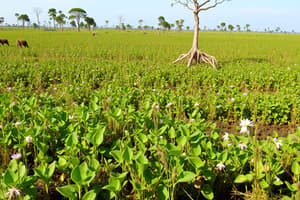Podcast
Questions and Answers
Match the following ecological terms with their definitions:
Match the following ecological terms with their definitions:
Ecosystem = All the living and nonliving things in an environment, including their interactions with each other Population = All the members of one species in an area Community = All the living things in an ecosystem Food chain = The path that energy and nutrients follow in an ecosystem
Match the following biotic factors with their descriptions:
Match the following biotic factors with their descriptions:
Producers = Organisms that use the sun’s energy to make sugar and oxygen Consumers = Organisms that eat plants or other animals for energy Predator = An animal that hunts other animals for food Prey = A living thing that is hunted for food
Match the following abiotic factors with their definitions:
Match the following abiotic factors with their definitions:
Energy pyramid = A diagram that shows the amount of energy available on each level in an ecosystem Sun = The source of energy in a food chain Herbivore = An organism that only eats plants Carnivore = An organism that only eats other animals
Match the following terms with their correct examples:
Match the following terms with their correct examples:
Match the following ecological terms with their correct descriptions:
Match the following ecological terms with their correct descriptions:
Flashcards are hidden until you start studying
Study Notes
Ecological Terms and Definitions
- Understanding ecological terms is crucial for studying ecosystems and environmental interactions.
Biotic Factors
- Biotic factors refer to living components of an ecosystem such as plants, animals, fungi, and microorganisms.
- Examples of biotic factors include predator-prey relationships, competition for resources, and symbiotic interactions.
Abiotic Factors
- Abiotic factors encompass non-living elements that influence the environment, including climate, soil, water, and sunlight.
- Important abiotic factors include temperature, pH levels, humidity, and nutrient availability in the soil.
Examples of Ecological Terms
- Examples help clarify concepts. For instance, "predation" is exemplified by a lion hunting zebras.
- Another example is "habitat," which may refer to a coral reef for marine species.
Importance of Matching Terms with Definitions
- Matching terms with definitions promotes a deeper understanding of ecological interactions and relationships.
- Effective categorization aids in grasping complex ecological concepts, enhancing both learning and retention.
Studying That Suits You
Use AI to generate personalized quizzes and flashcards to suit your learning preferences.




